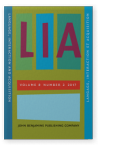Vol. 8:2 (2017) ► pp.273–287
Military L2 immersion
Language learning motivations among Finnish-speaking conscripts in a Swedish language garrison
The purpose of the present study was to examine some of the motivations and longitudinal consequences of military service in L2 Swedish for L1 Finnish conscripts in Finland’s only Swedish language garrison. Cross-sectional data (N = 42), analyzed with Bayesian path analysis, indicates that promotional instrumentality enhanced participants’ L2 ideal selves, but integrative orientation did not. The L2 ideal self predicts L2 learning intentions in the army, but only among learners with low L2 proficiency at the beginning of military service. Longitudinal data (N = 17), analyzed with a Bayesian model selection procedure, shows that after six months in the army, participants reported higher levels of L2 proficiency, lower levels of L2 use anxiety and more positive attitudes towards L2 speakers than at the beginning of military service.
Article outline
- 1.Introduction
- 2.Study 1: The cross-sectional study
- 2.1Theoretical background
- 2.2Method
- 2.2.1Participants
- 2.2.2Measures
- 2.2.3Analysis
- 2.4Results
- 2.5Discussion
- 3.Study 2: The longitudinal study
- 3.1Theoretical background
- 3.2Method
- 3.2.1Participants
- 3.2.2Measures
- 3.2.3Analysis
- 3.3Results
- 3.4Discussion
- 4.General discussion
- Acknowledgements
-
References
This article is currently available as a sample article.
